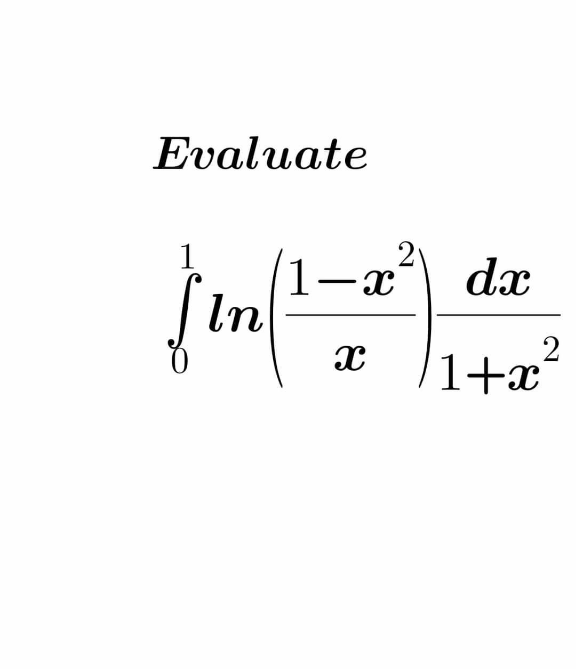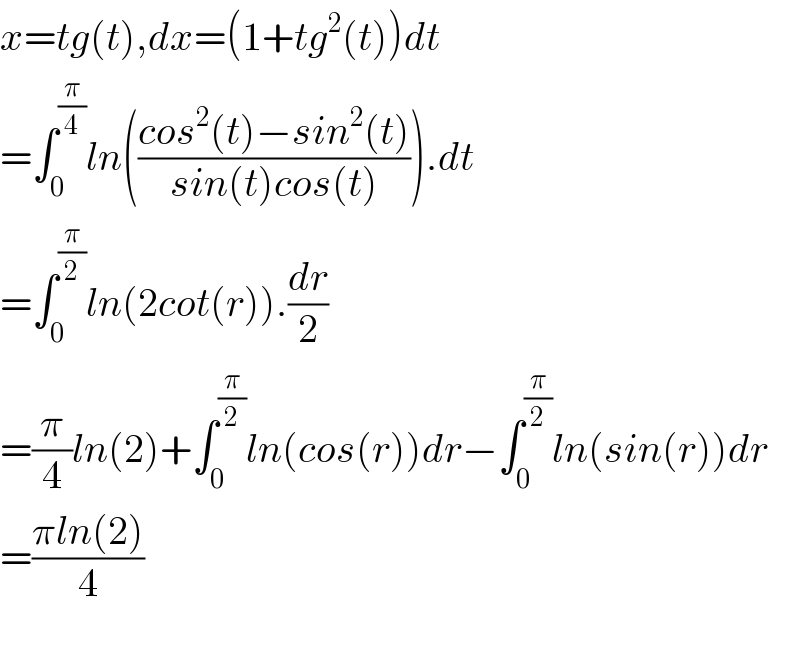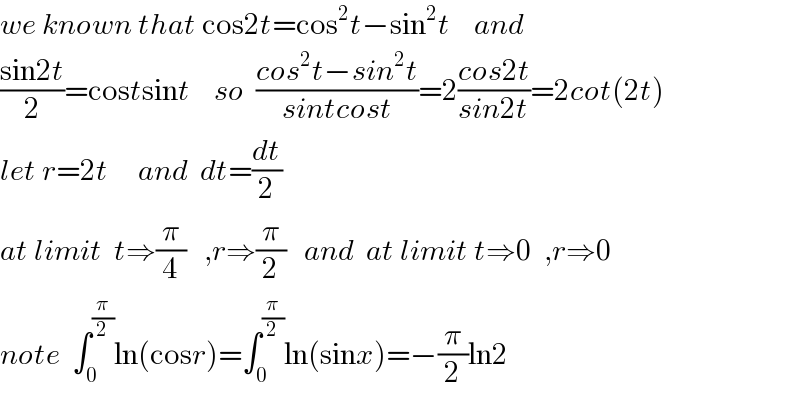Question Number 109342 by 150505R last updated on 22/Aug/20

Commented by maths mind last updated on 23/Aug/20

$${x}={tg}\left({t}\right),{dx}=\left(\mathrm{1}+{tg}^{\mathrm{2}} \left({t}\right)\right){dt} \\ $$$$=\int_{\mathrm{0}} ^{\frac{\pi}{\mathrm{4}}} {ln}\left(\frac{{cos}^{\mathrm{2}} \left({t}\right)−{sin}^{\mathrm{2}} \left({t}\right)}{{sin}\left({t}\right){cos}\left({t}\right)}\right).{dt} \\ $$$$=\int_{\mathrm{0}} ^{\frac{\pi}{\mathrm{2}}} {ln}\left(\mathrm{2}{cot}\left({r}\right)\right).\frac{{dr}}{\mathrm{2}} \\ $$$$=\frac{\pi}{\mathrm{4}}{ln}\left(\mathrm{2}\right)+\int_{\mathrm{0}} ^{\frac{\pi}{\mathrm{2}}} {ln}\left({cos}\left({r}\right)\right){dr}−\int_{\mathrm{0}} ^{\frac{\pi}{\mathrm{2}}} {ln}\left({sin}\left({r}\right)\right){dr} \\ $$$$=\frac{\pi{ln}\left(\mathrm{2}\right)}{\mathrm{4}} \\ $$$$ \\ $$
Commented by mathdave last updated on 23/Aug/20

$${you}\:{should}\:{ve}\:{explain}\:{better}\:{how}\:{you}\:{change}\: \\ $$$$\frac{\mathrm{cos}^{\mathrm{2}} {t}−\mathrm{sin}^{\mathrm{2}} {t}}{\mathrm{sin}{t}\mathrm{cos}{t}}=\mathrm{2cot}\left({r}\right)\:{for}\:{those}\:{that}\:{are}\:{not}\:{pro} \\ $$$${like}\:{u}\:. \\ $$$${let}\:{me}\:{put}\:{light}\:{on}\:{that}\:{area}\: \\ $$$$ \\ $$
Commented by mathdave last updated on 23/Aug/20

$${we}\:{known}\:{that}\:\mathrm{cos2}{t}=\mathrm{cos}^{\mathrm{2}} {t}−\mathrm{sin}^{\mathrm{2}} {t}\:\:\:\:{and} \\ $$$$\frac{\mathrm{sin2}{t}}{\mathrm{2}}=\mathrm{cos}{t}\mathrm{sin}{t}\:\:\:\:{so}\:\:\frac{{cos}^{\mathrm{2}} {t}−{sin}^{\mathrm{2}} {t}}{{sintcost}}=\mathrm{2}\frac{{cos}\mathrm{2}{t}}{{sin}\mathrm{2}{t}}=\mathrm{2}{cot}\left(\mathrm{2}{t}\right) \\ $$$${let}\:{r}=\mathrm{2}{t}\:\:\:\:\:{and}\:\:{dt}=\frac{{dt}}{\mathrm{2}} \\ $$$${at}\:{limit}\:\:{t}\Rightarrow\frac{\pi}{\mathrm{4}}\:\:\:,{r}\Rightarrow\frac{\pi}{\mathrm{2}}\:\:\:{and}\:\:{at}\:{limit}\:{t}\Rightarrow\mathrm{0}\:\:,{r}\Rightarrow\mathrm{0} \\ $$$${note}\:\:\int_{\mathrm{0}} ^{\frac{\pi}{\mathrm{2}}} \mathrm{ln}\left(\mathrm{cos}{r}\right)=\int_{\mathrm{0}} ^{\frac{\pi}{\mathrm{2}}} \mathrm{ln}\left(\mathrm{sin}{x}\right)=−\frac{\pi}{\mathrm{2}}\mathrm{ln2} \\ $$
